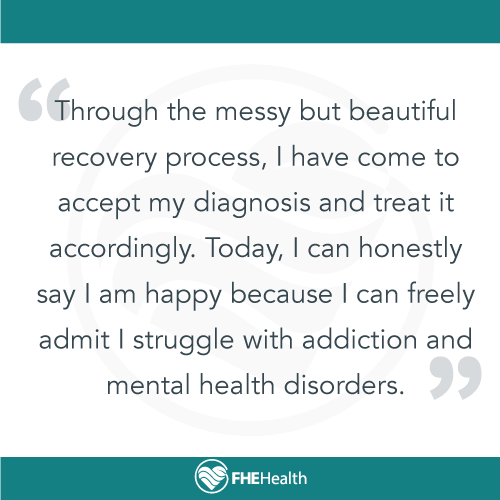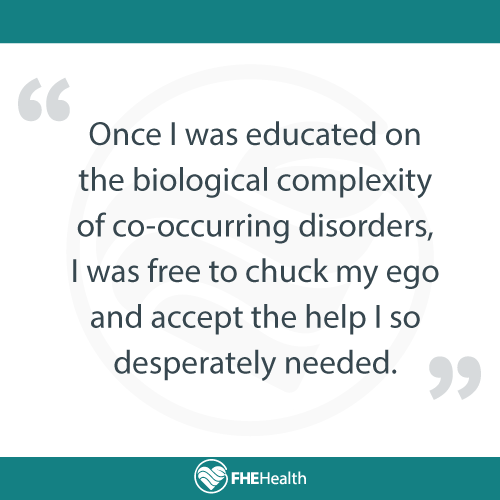
Navigating through my unrelenting drug/alcohol addiction has been quite a daunting task, but not nearly as intimidating as facing my co-occurring PTSD, anxiety, and depression disorders. Before getting sober, I never really considered the glaring symptoms of my untreated mental health disorders. Looking back to try and identify which came first – the substance abuse or the mental health disorders – is similar to asking whether the chicken or the egg came first. There is no real answer, nor would any answer change the outcome of the reality that I am in recovery from addiction and my mental health disorders.
My Co-Occurring Nightmare
When I was first considering rehab in Florida, my father suggested I look for a dual diagnosis program. He was insistent that I look for a facility that treated not only addiction but mental health as well. Upon entering treatment at FHE Health, I was riding the pink cloud all the way through the door. I was sure I was headed to rehab for a much-deserved vacation from reality – I couldn’t have been more misled. It wasn’t long before my mental health disorders’ symptoms began to rear their ugly heads, and without my daily dose of mind-altering substances, I was drowning. Years of my unacknowledged depression, anxiety, and depression rushed to the surface, and I was like a tourist in a foreign country with no map. I was only 5 when I had my first encounter with trauma, which was never addressed, much less validated. Avoidance became my first survival mechanism until I began to dissociate completely – I began to self-medicate with unhealthy relationships and self-victimization. Eventually, my coping mechanisms no longer worked, and I was reaching for anything drink, pill, or substance to relieve me of my insanity.
 As you can imagine, I was more than defiant when my old ideas and behaviors were challenged during FHE’s tough group therapy sessions. I remember being asked to recount my childhood trauma, and panic swept over me like a tsunami. Initially, I was paralyzed with feelings of inadequacy, guilt, shame, and so much fear. Then came my ever so familiar dissociative behaviors. I wore it like a warm blanket, comforting my tormented inner child. I remember being called out by the group facilitator and all of the members of the group. I spent my entire life ignoring the reality that perhaps I was suffering from mental health disorders as a direct result of my childhood experiences.
As you can imagine, I was more than defiant when my old ideas and behaviors were challenged during FHE’s tough group therapy sessions. I remember being asked to recount my childhood trauma, and panic swept over me like a tsunami. Initially, I was paralyzed with feelings of inadequacy, guilt, shame, and so much fear. Then came my ever so familiar dissociative behaviors. I wore it like a warm blanket, comforting my tormented inner child. I remember being called out by the group facilitator and all of the members of the group. I spent my entire life ignoring the reality that perhaps I was suffering from mental health disorders as a direct result of my childhood experiences.
Anyone who has experienced depression, anxiety and PTSD can relate to the overwhelming feelings that demand to be felt. These disorders robbed me of happiness for decades. My depression blindsided me at times when I was supposed to be happy. My anxiety had the impeccable timing of showing up in times when everything was seemingly calm. My PTSD was the root cause of 99.9% of my self-destructive behaviors. My co-occurring disorders kept me using and drinking in a failed attempt to self-medicate my untreated misery. Through the messy but beautiful recovery process, I have come to accept my diagnosis and treat it accordingly. Today, I can honestly say I am happy because I can freely admit I struggle with addiction and mental health disorders. Awareness is key. Here are a few ways I have found peace with my co-occurring disorders and continue to cultivate happiness.
Awareness is Key
 Understanding the biological complexity involved with co-occurring disorders is vital to healing and finding your happiness. Completely unaware and ignorant of what I was truly up against, the odds were initially stacked against me. After all, how could I properly treat all of the components of my mental illness without acknowledging they existed? The medical professionals at FHE helped me to dig deeper than the substance abuse issues I was facing. Looking past my substance use disorder symptoms, we examined the root causes of why I thought, behaved, and reacted the way I did. We took it a step further and looked at my genetic predisposition to the mental health disorders I struggled with. As it turns out, there was a long lineage of mental health issues trailing through my family tree. Once I acknowledged the co-occurring disorders I was suffering from, I was able to use this awareness to start my journey to healing.
Understanding the biological complexity involved with co-occurring disorders is vital to healing and finding your happiness. Completely unaware and ignorant of what I was truly up against, the odds were initially stacked against me. After all, how could I properly treat all of the components of my mental illness without acknowledging they existed? The medical professionals at FHE helped me to dig deeper than the substance abuse issues I was facing. Looking past my substance use disorder symptoms, we examined the root causes of why I thought, behaved, and reacted the way I did. We took it a step further and looked at my genetic predisposition to the mental health disorders I struggled with. As it turns out, there was a long lineage of mental health issues trailing through my family tree. Once I acknowledged the co-occurring disorders I was suffering from, I was able to use this awareness to start my journey to healing.
Demolish Your Ego
Mental illness continues to be plagued by stigmas perpetuated in even the most advanced society in the free world. Not many people are eager to admit they are struggling with anxiety and depression. Mental illness is often stigmatized as a hopeless weakness. This couldn’t be further from the truth. I remember thinking to myself, “Great, I’m not just an addict, but I’m also crazy.” This unhealthy association stunted was driven by my ego and hindered my healing for far too long. Once I was educated on the biological complexity of co-occurring disorders, I was free to chuck my ego and accept the help I so desperately needed.
Get Professional Help
After leaving treatment at FHE, I was beginning to feel much better. It wasn’t long before I stopped attending therapy that I began to fall back into my old patterns of behavior. I managed to last three years in sobriety before my mental illness symptoms were exacerbated once again. I associate this with my lack of participation in therapy. After enough pain and self-will run riot, I dove back into trauma therapy head-on. There is no shame in seeking the professional help you need, in fact, I believe it is directly responsible for the beautiful life I live today. Therapy has absolutely revolutionized my life in recovery. Through therapy, I have been able to identify unhealthy thought patterns and behaviors while also learning how to cope with life in a sober, healthy, and productive way.
Actively Pursue Your Mental Illness Recovery – Just the Same As your Addiction Recovery
Perhaps the most beneficial action I have taken in my sobriety has been pursuing recovery from my mental illness while simultaneously recovering from substance abuse. I began to apply the same 12 steps to my co-occurring mental illnesses. I became accountable to my therapist while also being accountable with my sponsor. I accepted that I am powerless over my mental health disorders and became willing to let go of all judgments and pursue my healing. Through applying the 12 steps to my co-occurring disorders, I had the most comprehensive healing package I could ever hope for. I experienced accountability, which helped me avoid relapsing into old patterns of thoughts and behaviors and reaping the benefits of truly living a life beyond my wildest dreams.
Most of us addicts and alcoholics inherently struggle with accepting what we deserve. I spent most of my life avoiding happiness because I didn’t think I deserved it. For me, happiness is a gift wrapped in a package called radical acceptance. The more I begin to accept things exactly as they are, the less likely I am to resist the reality of the world around me and embrace genuine happiness.






